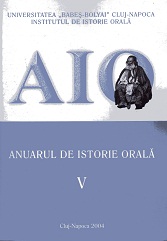INFERN SAU PARADIS PIERDUT? ASPECTE DIN VIAŢA MUNCITOARELOR DIN CLUJ-NAPOCA (1965-1989)
INFERNO OR PARADISE LOST? LIFE ASPECTS OF FEMALE WORKERS IN CLUJ-NAPOCA (1965-1989)
Author(s): Denisa Florentina BodeanuSubject(s): History
Published by: Argonaut
Summary/Abstract: The issue presented in this study has not been one of the contemporary history’s priorities until now; it describes aspects in the life of female workers in the above mentioned period of time, identifying the main key factors used by the communist state in order to impose a certain life style and a mentality that goes along with the perceptions of a totalitarian ideology. Another issue that has the same importance, is the effect of educational and communist life style on the mentality of the women we interviewed. This study uses traditional sources, represented by books and articles, as well as some interviews recorded in the spring of 2003, with female workers who worked during 1965-1989 at the main factories in Cluj-Napoca. In Romania, as well as in all communist countries, there was a triple dimension to a woman’s duty in the society: she had to be mother, wife and worker at the same time. In a communist society the female worker is given as an example, the women’s emancipation being directly linked to having a job. What the communist regime actually did was the fact that it used the Marxist ideas regarding equality between sexes as means to fulfill its main objective, which was to chain individuals and impose its hegemony upon them. Thus, we analyze this highlighting of woman’s emancipation during communism, considering the authorities’ main objectives in a totalitarian state: changing the traditional woman, building up a society where workers prevail, and acquiring total control over its citizens. There is no doubt that due to the communist state’s sustained efforts “a new people” was born during 1945–1989, consisting of individuals with no personality, easy to manipulate, whose purpose in life was limited to accumulating goods and satisfying the basic material needs. The only political education these people were given consisted in Nicolae Ceausescu’s speeches, and historical movies - but only the ones approved by the Party. People got used to the idea that the state will provide them with the minimum material comfort, being incapable of understanding the values of a democratic regime. These are individuals who understood freedom in a completely different way, preferring to serve in exchange of an almost miserable but safe everyday living.
Journal: Anuarul Institutului de Istorie Orală
- Issue Year: 2004
- Issue No: V
- Page Range: 307-337
- Page Count: 31
- Language: Romanian

